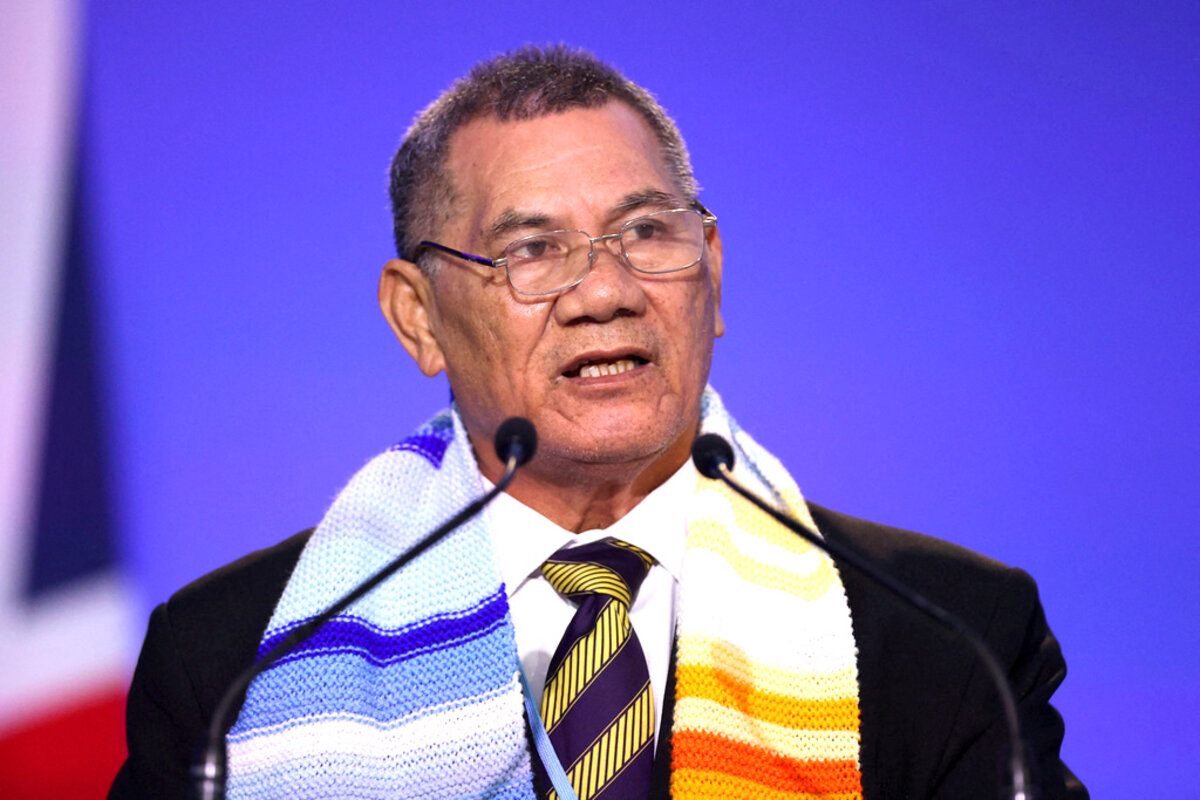As tensions rise in the West Bank, Palestinians there are increasingly frustrated with their government. Amid prisoner exchanges in Gaza, some West Bank Palestinians are now flying the green flag of Hamas. It’s not a sign of support so much as a pent-up demand for change.

Why is Christian Science in our name?
Our name is about honesty. The Monitor is owned by The Christian Science Church, and we’ve always been transparent about that.
The Church publishes the Monitor because it sees good journalism as vital to progress in the world. Since 1908, we’ve aimed “to injure no man, but to bless all mankind,” as our founder, Mary Baker Eddy, put it.
Here, you’ll find award-winning journalism not driven by commercial influences – a news organization that takes seriously its mission to uplift the world by seeking solutions and finding reasons for credible hope.
Explore values journalism About usMonitor Daily Podcast
- Follow us:
- Apple Podcasts
- Spotify
- RSS Feed
- Download
 Mark Sappenfield
Mark Sappenfield
A rescue operation that was supposed to last a few days is now over. Seventeen days after a tunnel under construction collapsed in the Indian Himalayas, the 41 miners trapped inside are free.
Two different drilling machines broke before a team of miners used a technique called rat-hole mining – so dangerous it was outlawed in 2014 – to at last get through. It is as unpleasant as it sounds, navigating tight spaces with only a hand drill. But “when we saw them inside the tunnel after the breakthrough,” one rescuer said, “we hugged them like they were family.”
Already a subscriber? Log in
Help fund Monitor journalism for $11/ month
Monitor journalism changes lives because we open that too-small box that most people think they live in. We believe news can and should expand a sense of identity and possibility beyond narrow conventional expectations.
Our work isn't possible without your support.
Today’s stories
And why we wrote them
( 5 min. read )
( 6 min. read )
Among the array of lawsuits facing former President Donald Trump, he seems to find the fraud case in New York particularly galling. Here, we help sort out the details of the case and examine what it could mean to Mr. Trump.
( 9 min. read )
The lack of affordable child care is holding back the United States. It is keeping parents out of the workforce, stunting household financial stability and the economy. But in Maine, a fresh idea: the Child Care Business Lab, which makes it easier for entrepreneurs to offer child care. Early results are promising.
( 5 min. read )
Advancements can bring huge benefits, but also leave some people behind. In India, growing diamonds in a lab could be an economic boom. But for Surat, a global hub of the diamond trade, the idea imperils wealth and a way of life. Can the industry be profitable for all?
( 4 min. read )
How can you tell if animals are coming back to restored ecosystems? Just listen. An acoustic monitoring system in Ecuador is one of our global points of progress this week. We also have a creative attempt to address food insecurity in England, and China showing humility. Its job training program is taking into account other countries’ needs.
The Monitor's View
( 2 min. read )
Every time the world gathers to measure its progress in addressing climate change, doubts and hopes collide. The annual United Nations climate conference that started today in Dubai is no different. It will showcase new advances in technology but underscore missed targets.
One point these meetings repeatedly affirm, however, is that smaller gestures and local agency matter as much as global agreements in breaking the world’s dependency on fossil fuels and adapting to a warming planet. A novel agreement between Australia and the island nation of Tuvalu in the South Pacific holds useful lessons.
The two countries brokered the world’s first bilateral agreement on climate mobility earlier this month. With a highest elevation of just 15 feet, the nine-island nation of Tuvalu faces the risk of being swallowed by sea-level rise. Under the deal, designed to ensure “human mobility with dignity,” Australia has extended an open invitation to Tuvalu’s 11,000 residents to study, live, and work in Australia permanently.
Critics of the offer note that it gives Australia a veto over future diplomatic relationships Tuvalu may pursue with other countries, reflecting Canberra’s strategic concerns about China’s regional influence. But it shows that climate agreements between nations – particularly between richer and poorer nations – do not always hinge on financial obligations. They can be forged on common values like compassion and justice.
“Dignified, rights-based responses to climate mobility are crucial,” notes Jane McAdam, director of the Kaldor Centre for International Refugee Law at the University of New South Wales. The deal emphasizes the importance of preserving individual agency. An open assurance of safe haven, she said, also means Tuvaluans can “stay in their homes with safety and dignity” for as long as they desire.
The deal also reflects a growing view that adapting to climate change fits into the existing international framework of rights – and that nations are therefore bound together by obligations of mutual care. “A human rights approach ... has the potential to address injustices and inequities that exist between states,” the authors wrote in the journal Climate Action last week. That involves protecting “the adaptive capacity of individuals” amid climate disruptions.
The government officials, scientists, and activists seeking new resolve and cooperation in Dubai can draw on the world’s expanding pursuit of solutions to climate change through local measures. In their response to the potential threat of climate dislocation, Australia and Tuvalu offer one model of adaptation rooted in a defense of individual dignity.
A Christian Science Perspective
Each weekday, the Monitor includes one clearly labeled religious article offering spiritual insight on contemporary issues, including the news. The publication – in its various forms – is produced for anyone who cares about the progress of the human endeavor around the world and seeks news reported with compassion, intelligence, and an essentially constructive lens. For many, that caring has religious roots. For many, it does not. The Monitor has always embraced both audiences. The Monitor is owned by a church – The First Church of Christ, Scientist, in Boston – whose founder was concerned with both the state of the world and the quality of available news.
( 3 min. read )
When troubles arise, we can rely on Christ for inspiration that not only keeps us afloat, but heals.
Viewfinder
Palestinian children play during the Eid al-Adha holiday, in Gaza City, June 6, 2025.

A look ahead
Thank you for joining us today. Tomorrow, we’ll head into the political ring for a 12-round prize fight: Whose approach to governing the United States is better, blue or red? Media personality Sean Hannity invited Florida’s Republican governor, Ron DeSantis, and California’s Democratic governor, Gavin Newsom, to have a debate. Our contribution: a set of graphics that gets below the talking points to explore key factual comparisons. Make sure to bring some popcorn.









